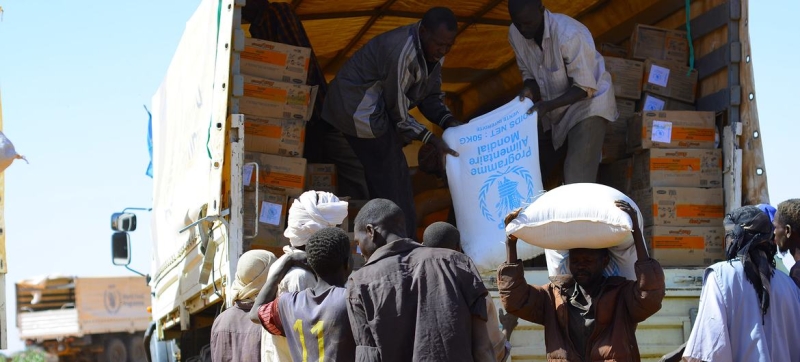
Food aid for residents of Zamzam camp in North Darfur. ‘A crisis of staggering proportions’: Security Council discusses situation in Sudan Peace and security
Sudan is in the grip of a humanitarian crisis of staggering proportions, Edem Wosornu, a spokesperson for the UN Office for the Coordination of Humanitarian Affairs (OCHA), told a briefing at the UN Security Council.
An estimated 8.8 million people have fled their homes and sought refuge inside the country since armed conflict began in Sudan in April 2023. More than 3.2 million more have fled to neighbouring countries. Some 21 million people – almost half of Sudan’s population – require humanitarian assistance.
Famine continues to spread
Wosornu stressed that Sudan is now the only country in the world where famine is officially confirmed, and it continues to spread rapidly.
The latest analysis shows that famine conditions are currently observed in five areas, including the Zamzam, Al-Salam and Abu Shouk internally displaced person camps, as well as in the western Nuba Mountains. Many of these areas are at risk of famine.
Beth Bechdol, deputy director of the UN Food and Agriculture Organization (FAO), told the Security Council that almost two-thirds of Sudan’s population depends on agriculture, with sorghum, millet and wheat the main crops.
“In the first year of the conflict, the 2023/24 season, production of these crops amounted to 4.1 million tonnes… this is 46 percent less than the year before,” she said. The harvest that was lost in Sudan could have fed 18 million people.
“Production of minor crops such as sesame, sunflower, groundnuts and cotton was also significantly below average,” she added.
Escalation of hostilities
In addition to the sharp decline in production, the OCHA and FAO representatives noted that armed clashes are having a severe impact on the population’s access to food.
Fighting escalated in December, Wosornou said, including in the Zamzam camp for displaced persons, where civilians were killed and injured by shelling.
Fighting also continues in other parts of the country, including Khartoum, Ay Jazeera, Sennar, South Kordofan and West Kordofan.
The OCHA spokeswoman also stressed that aid workers are being killed in Sudan. On December 19, three World Food Programme (WFP) staff were killed in an airstrike in Yabus, Blue Nile State.
Humanitarian Operations Restricted
Wosornu noted that access to areas that need aid most remains a fundamental problem. For example, key areas of South Kordofan remain completely cut off from aid, and new restrictions are being imposed at the Adre crossing on the Sudan-Chad border.
At the same time, progress has been made in delivering humanitarian aid in a number of areas.
“We have seen some positive steps in recent weeks. On December 25, a convoy of 28 trucks carrying food, supplies and other aid arrived in Khartoum from Port Sudan,” she said. The delivery of the supplies was made possible by negotiations that have been ongoing for several weeks.
“Last week, a separate convoy of the World Food Programme was able to deliver food to the city of Abu Jubeiha and the surrounding areas in South Kordofan,” Wosornu added.
Three requests to the Security Council
She recalled that the humanitarian community still has three requests to make to the UN Security Council members.
“First, we need your help in pressing the parties to comply with international humanitarian law. This includes the obligation to meet the basic needs of civilians, protect infrastructure, and ensure the delivery of essential goods and services needed to sustain food systems and produce food,” Wosornu said.
“We reiterate our call for an immediate cessation of hostilities and for real and inclusive steps towards the lasting peace that the people of Sudan so desperately need,” she added.
The OCHA spokesperson also stressed the need for Security Council support in ensuring humanitarian access.
“We need your influence to ensure that all routes – by road and air, across conflict lines and borders – are open for humanitarian aid and personnel. “Bureaucratic hurdles must be removed and permits and visas for incoming personnel must be issued quickly and efficiently,” Wosornu said.
Third, she noted, the unprecedented scale of Sudan’s needs requires an unprecedented mobilization of international support.
$4.2 billion will be needed in 2025 to support nearly 21 million people in Sudan. An additional $1.8 billion is needed to support refugees in neighboring countries, she concluded.
